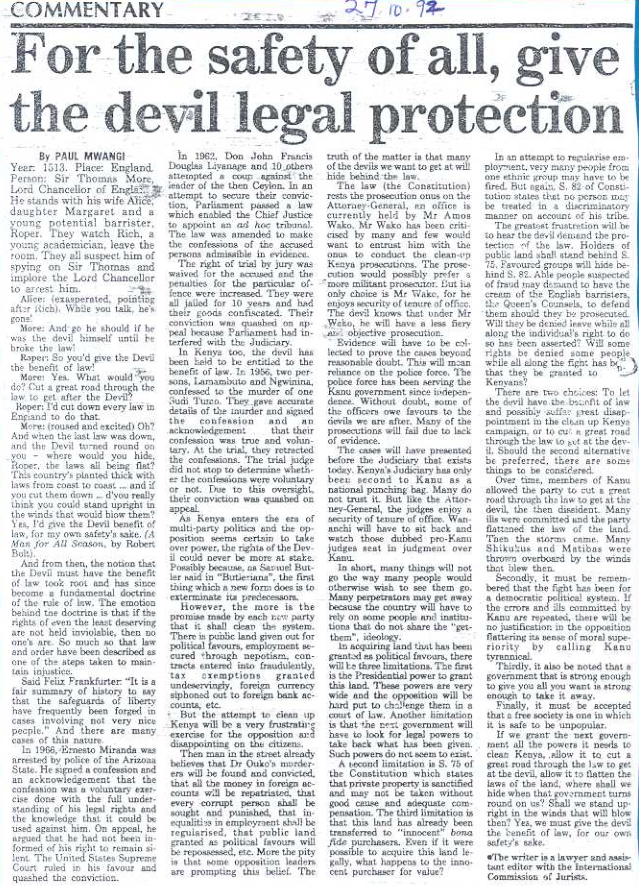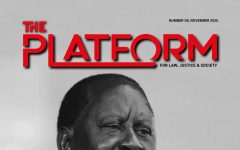Year: 1513. Place: England. Person: Sir Thomas More, Lord Chancellor of England. He stands with his wife Alice, daughter Margaret and a young potential barrister, Roper. They watch Rich, a young academician, leave the room. They all suspect him of spying on Sir Thomas and implore the Lord Chancellor to arrest him.
Alice: (exasperated, pointing after Rich) While you talk, he’s gone!
More: And go he should if he was the devil himself until he broke the law.
Roper: So, you’d give the Devil the benefit of the law!
More: Yes. What would you do? Cut a great road through the law to get after the Devil?
Roper: I’d cut down every law in England to do that.
More: (roused and excited) Oh? And when the last law was down, and the Devil turned round on you-where would you hide, Roper, the laws all being flat? This country is planted thick with laws from coast to coast…and if you cut them down…d’you really think you could stand upright in the winds that would blow them? Yes, I’d give the Devil benefit of the law, for my own safety’s sake. (A Man for All Season, by Robert Bolt).
And from then, the notion that the Devil must have the benefit of the law took root and has since become a fundamental doctrine of the rule of law. The emotion behind the doctrine is that if the rights of even the least deserving are not inviolable, then no one’s are. So much so that law and order have been described as one of the steps taken to maintain injustice.
Said Felix Franfurter: “It is a fair summary of history to say that the safeguards of liberty have frequently been forged in cases involving not very nice people.” And there are many cases of this nature. In 1966, Ernesto Miranda was arrested by police of the Arizona State. He signed a confession and an acknowledgement that the confession was a voluntary exercise done with the understanding of his legal rights and the knowledge that it could be used against him. On appeal, he argued that he had not been informed of his right to remain silent. The United States Supreme Court ruled in his favour and quashed the conviction.
In 1962, Don John Francis Douglas Liyanage and 10 others attempted a coup against the leader of the then Ceylon. In an attempt to secure their conviction, Parliament passed a law which enabled the Chief Justice to appoint an ad hoc tribunal. The law was amended to make the confessions of the accused persons admissible in evidence. The right of trial by jury was waived for the accused and the penalties for the particular offence were increased. They were all jailed for 10 years and had their goods confiscated. Their conviction was quashed on appeal because Parliament had interfered with the Judiciary.
In Kenya too, the devil has been held to be entitled to the benefit of the law. In 1956, two persons, Lamambuto and Ngwinina, confessed go the murder of one Sum Turco. They gave accurate details of the murder and signed the confession and an acknowledgement that their confession was true and voluntary. At the trial, they retracted their confessions. The trial judge did not stop to determine whether the confessions were voluntary or not. Due to this oversight, their conviction was quashed on appeal.
As Kenya enters the era of multi-party politics and the opposition seems certain to take over power, the rights of the Devil could never be more at stake. Possibly, because, as Samuel Butler said in “Butlexiana”, the first thing which a new form does is to exterminate its predecessors.
However, the more is the promise made by each new party that it shall clean the system. There is public land given out for political favours, employment secured through nepotism, contracts entered into fraudulently, tax exemptions granted undeservingly, foreign currency siphoned out to foreign bank accounts etc. But the attempt to clean up Kenya will be a very frustrating exercise from the opposition and disappointing on the citizens.
The man on the street already believes that Dr. Ouko’s murderers will be found and convicted, that all the money in foreign accounts will be repatriated, that every corrupt person shall be sought and punished, that inequalities in employment shall be regularized, that public land granted as political favours will be repossessed, etc. More the pity is that some opposition leaders are prompting this belief. The truth of the matter is that many of the devils we want to get at will hide behind the law.
The law (the Constitution) rests the prosecution onus on the Attorney-General, an office is currently held by Mr. Amos Wako. Mr. Wako has been criticized by many and few would want to entrust him with the onus to conduct the cleanup Lenya prosecutions. The prosecution would possibly prefer a more militant prosecutor. But his only choice is Mr. Wako, for he enjoys security of tenure of office. The devil knows that under Mr. Wako, he will have a less fiery and objective prosecution.
Evidence will have to be collected to prove the cases beyond reasonable doubt. This will mean reliance on the police force. The police force has been serving the KANU government since independence. Without doubt, some of the officers owe favours to the devils we are after. Many of the prosecutions will fail due to lack of evidence.
The cases will have presented before the Judiciary that exists today. Kenya’s Judiciary has only been second to KANU as a national punching bag. Many do not trust it. But like the Attorney-General, the judges enjoy a security of tenure of office. Wananchi will have to sit back and watch those dubbed pro-KANU judges seat in judgment over KANU.
In short, many things will not go the way many people would otherwise wish to see them go. Many perpetrators may get away because the country will have to rely on some people and institutions that do not share the “get them” ideology.
In acquiring land that has been granted as political favours, there will be three limitations. The first is the Presidential power to grant this land. These powers are very wide and the opposition will be hard put to challenge them in a court of law. Another limitation is that the next government will have to look for legal powers to take back what has been given. Such powers do not seem to exist.
A second limitation is Section 75 of the Constitution which states that private property is sanctified and may not be taken without good cause and adequate compensation. The third limitation is that this land has already been transferred to “innocent” bonafide purchasers. Even if it were possible to acquire this land legally, what happens to the innocent purchaser for value?
In an attempt to regularise employment, very many people from one ethnic group may have to be fired. But again, Section 82 of the Constitution states that no person may be treated in a discriminatory manner on account of is tribe.
The greatest frustration will be to hear the Devil demand the protection of the law. Holders of public land shall stand behind Section 75. Favoured groups will hide behind Section 82. Able people suspected of fraud may demand to have the cream of the English barristers, the Queen Counsels, to defend them should they be prosecuted. Will they be denied leave while all along the individual’s right to do so has been asserted? Will some rights be denied some people while all along the fight has been that they be granted to all Kenyans?
There are two choices: To let the devil have the benefit of law and possibly suffer great disappointment in the cleanup Kenya campaign, or to cut a great road through the law to get at the devil. Should the second alternative be preferred, there are some things to be considered.
Over time, members of KANU allowed the party to cut a great road through the law to get at the devil, the then dissident. Many ills were committed and the party flattened the law of the land. Then the storms came. MANY Shikukus and Matibas were thrown overboard by the winds that blew then.
Secondly, it must be remembered that the fight has been a democratic political system. If the errors and ills committed by KANU are repeated, there will be no justification in the opposition flattening its sense of moral superiority by calling KANU tyrannical
Thirdly, it should also be noted that a government that is strong enough to give you all you want is strong enough to take it away.
Finally, it must be accepted that a free society is one which it is safe to be unpopular.
If we grant the next government all the powers it needs to clean Kenya, allow it to cut a great road through the law to get at the devil, allow it to flatten the laws of the land, where shall we hide when tat government turns around on us? Shall we stand upright in the winds that will blow then? Yes, we must give the devil the benefit of the law, for our own safety’s sake.




